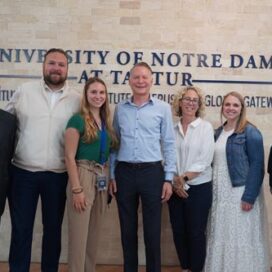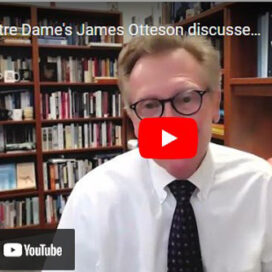2019’s best books for ethical leaders
Published: December 20, 2019 / Author: Deloitte Center for Ethical Leadership
Since 2017, the Notre Dame Deloitte Center for Ethical Leadership has been on the lookout for the best new books that bridge the worlds of business and academia. We look in particular for books that provide practical insights on how to live and work more ethically. Our 2019 list focuses on four emerging issues all ethical leaders are facing.
The Promise and Challenges of Business as a Force for Good
2019 was a year in which many leaders took grandstands on the social benefits of business: The Business Roundtable released a new statement on the purpose of a corporation, and the World Economic Forum published its “Davos Manifesto,” calling for a “new kind of capitalism.” In order to ensure that these grandstands are more than empty grandstanding, it is important for us to think deeply about the history and future of moral, socially-conscious capitalism. For a look at where moral capitalism is (or ought to be) going, check out Paul Colliers’s The Future of Capitalism: Facing the New Anxieties. For the fascinating history of earlier capitalists who tried (and sometimes failed) to use business as a force for good, read The Enlightened Capitalists: Cautionary Tales of Business Pioneers Who Tried to Do Well by Doing Good by James O’Toole.
Fostering Inclusion and Connection
It’s no secret that we live in an era riven by differences in identity and ideology. Nevertheless, both research and real-world experience suggest practices, mindsets, and tactics that can make the world more harmonious and more inclusive. In The War for Kindness: Building Empathy in a Fractured World by Jamil Zaki, learn from a Stanford Psychologist about the power of empathy to bridge divisions. In The Moment of Lift: How Empowering Women Changes the World by Melinda Gates, gain wisdom from the front lines of female empowerment around the world. In Biased: Uncovering the Hidden Prejudice That Shapes What We See, Think, and Do by Jennifer L. Eberhardt, learn what science has to say about resisting and undoing our automatic responses to difference. Finally, in Why Are We Yelling?: The Art of Productive Disagreement by Buster Benson, learn a simple set of strategies for making your next argument productive rather than destructive.
Responding to New Technologies and their Challenges
As the Fourth Industrial Revolution unfolds, leaders need to immerse themselves in learning about new technologies like artificial intelligence in order to move them in a more human direction. Stuart Russell’s Human Compatible: Artificial Intelligence and the Problem of Control offers a powerful overview of AI and an engaging look at its ethical promise and perils. Leaders also need to know when to unplug and find solitude away from technology. Cal Newport’s Digital Minimalism: Choosing a Focused Life in a Noisy World offers a practical process for focusing on the technologies that matter—and discarding the rest.
Focusing on the Big Picture
As much as it is easy for ethical leaders to become absorbed with the causes of the day (or hour), leaders also need to zoom out and connect followers to general, timeless truths. In Range: How Generalists Triumph in a Specialized World David Epstein shares the counterintuitive evidence that it is often those who dabble, acquire a broad set of skills, and follow their passions and curiosities who ultimately have the biggest impact. And Aristotle’s Way: How Ancient Wisdom Can Change Your Life by Edith Hall shows that 2,300 year-old ideas about ethics are beneficial for deciding what sort of life is most valuable, even in the 21st century.
The Full List of Best Books for Ethical Leaders, 2019
- The Future of Capitalism: Facing the New Anxieties by Paul Collier
- The Enlightened Capitalists: Cautionary Tales of Business Pioneers Who Tried to Do Well by Doing Good by James O’Toole
- The War for Kindness: Building Empathy in a Fractured World by Jamil Zaki
- The Moment of Lift: How Empowering Women Changes the World by Melinda Gates
- Biased: Uncovering the Hidden Prejudice That Shapes What We See, Think, and Do by Jennifer L. Eberhardt
- Why Are We Yelling?: The Art of Productive Disagreement by Buster Benson
- Human Compatible: Artificial Intelligence and the Problem of Control by Stuart Russell
- Digital Minimalism: Choosing a Focused Life in a Noisy World by Cal Newport
- Range: How Generalists Triumph in a Specialized World by David Epstein
- Aristotle’s Way: How Ancient Wisdom Can Change Your Life by Edith Hall
Originally posted on ND Deloitte Center for Ethical Leadership’s site here.
Related Stories




